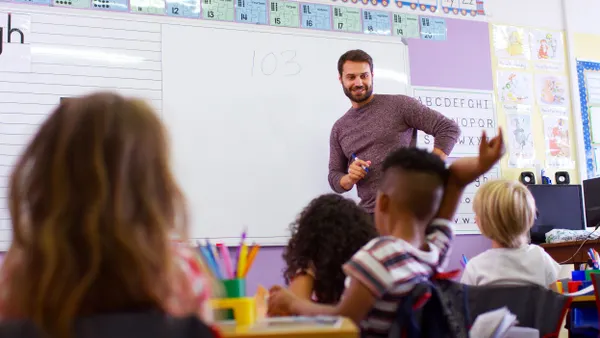Dive Brief:
- State and local school systems are committing a notable amount of federal emergency relief funds toward literacy development activities, including phonics-based teacher training, instruction and materials, according to several sources and news reports.
- The state education agencies in Utah, North Carolina and other states, as well as 35 of the nation’s 100 largest school districts, have indicated they are budgeting money from Elementary and Secondary School Emergency Relief funds for literacy training, according to Phyllis Jordan, associate director of FutureEd at Georgetown University, and Bella DiMarco, a policy analyst at FutureEd.
- The interest in using ESSER money on literacy development is likely due to disappointing reading assessment results during the pandemic that showed lower than expected progress, as well as the widening of achievement gaps between White, wealthier students and students of color and those from low-income families.
Dive Insight:
Jordan said the infusion of COVID-19 relief dollars has increased efforts at phonics-based instruction approaches that teach younger students the sounds that letters and syllables make.
"Which is not to say that every single literacy training follows a science of reading, but we did find quite a bit that fell into that evidence based space," Jordan said.
State and local budgets for literacy programs could include expenses of contracting with trainers, stipends for teachers to attend trainings, the hiring of reading specialists, materials and other costs, DiMarco said.
Virginia's Richmond Public Schools, for instance, plans to spend $10 million in ESSER III money to assist 40 teachers earning their reading specialist endorsement and 130 teachers to become literacy equity leads. Additionally, there are plans for 150 teachers to earn LETRS or Language Essentials for Teachers of Reading and Spelling certification, and 300 teachers to earn a CORE Literacy “badge.”
The funding will also go toward stipends to plan, execute, and attend a literacy institute, a data platform to facilitate teacher professional development, and instructional coaching partnerships.
In North Carolina, $12 million of the state’s ESSER share is dedicated to LETRS training for educators. LETRS is offered by the Cambium Learning Group and supports teachers' mastery of the foundations for reading instruction, including phonological awareness, phonics, fluency, vocabulary, comprehension, writing, and language.
Utah is also setting aside nearly $12 million in state ESSER money for LETRS training. Districts in Utah will be invited to participate in the training based on local performance data, according to the state plan.
Jordan said the focus on the LETRS training for educators may be due to impressive NAEP reading results from Mississippi announced in 2019. The Regional Educational Laboratory at Florida State University documented improvements to teacher's early literacy knowledge and instruction after teachers received training from the LETRS program, according to a 2017 report.
In Tennessee, a push to prioritize phonics and high-quality instructional materials in reading instruction has resulted in English assessment results that match or exceed pre-pandemic levels, Education Commissioner Penny Schwinn told a House subcommittee on Sept. 20.
More than 28,000 teachers across the state received professional development on the science of reading, grounded in sounds-first, phonics-based instruction, Schwinn said.
Additionally, 77% of districts joined early literacy networks focused on the science of reading, and a subset of 48 districts participated in an additional leadership network focused on high-quality instructional materials.
The state also has used ESSER funding to support the Tennessee Accelerating Literacy & Learning Corp, a three-year, high-dosage tutoring program focused on reading and math.
"Phonics-based instruction, systematic phonics-based instruction in the science of reading is pivotal and I would say completely research based and absolutely essential to teach a child to read, I think, especially for those students who have trouble learning to read, students with characteristics of dyslexia, etcetera," Schwinn told lawmakers.














